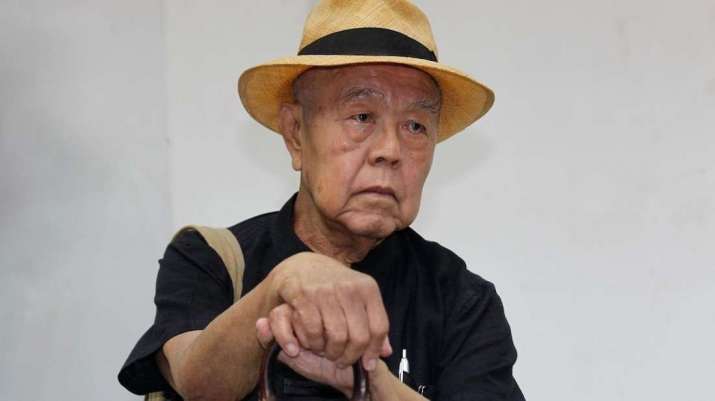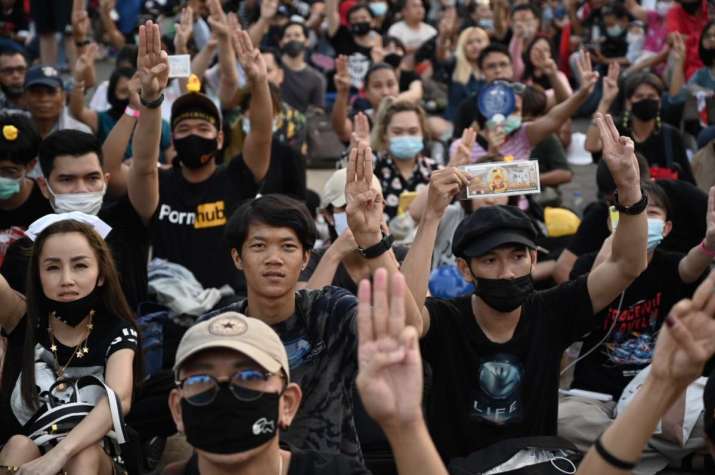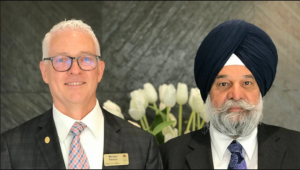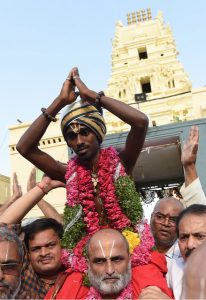
The prominent engaged Buddhist and social activist Sulak Sivaraksa made an unexpected public appearance on Wednesday night during ongoing pro-democracy demonstrations in Bangkok, during which he expressed solidarity with the protestors and called on Thailand’s prime minister, the former military general Prayut Chan-o-cha, to relinquish power.
Sulak’s appearance comes in the wake of a move by the military-aligned Thai government to revive controversial legislation that prohibits criticizing the royal family, in a bid to curb months of anti-government protests.
In a short speech to the assembled crowds of protestors, Sulak, founder of the International Network of Engaged Buddhists (INEB), criticized Prayuth for disregarding the wishes of Thailand’s late King Rama IX, Bhumibol Adulyadej (r. 1946–2016), and reigning King Rama X, Vajiralongkorn, who both publicly stated that Thailand’s strict lèse-majesté legislation, known as Article 112 of the penal code, should not be abused to persecute people who criticize the monarchy.
https://www.facebook.com/plugins/video.php?height=314&href=https%3A%2F%2Fwww.facebook.com%2Fbeverzs%2Fvideos%2F3954054564605359%2F&show_text=false&width=560
Sulak, who has been at the forefront of the global socially engaged Buddhism movement, delivered his brief public address at the protest site in downtown Bangkok. A self-proclaimed royalist, Sulak has repeatedly shared his conviction that “loyalty demands dissent,” which also became the title of his autobiography. He has himself been charged under Thailand’s lèse-majesté laws on at least four separate occasions, but has never been convicted.*
Amid growing public opposition to the government, charges have been filed against a number of social activists under Article 112, which carries hash prison terms of up to 15 years for each count. It is the first time in more than two years that such charges have been filed.
Sulak, who has been dubbed the “Socrates of Thailand” by admirers on social media, and is widely respected in pro-establishment and royalist circles, stated that by resorting to Article 112 to quash public dissent, Prayut’s government was itself damaging the institution of the monarchy and should therefore be removed from power.
One of the speakers for tonight's protest is longtime author, Buddhist scholar, and royalist Sulak Sivaraksa, who opposes the return of lese majeste charges. Sulak himself has been charged several times with the offense for discussing the monarchy. #Thailand #25พฤศจิกาไปSCB pic.twitter.com/H4KkilYSx6
— Khaosod English (@KhaosodEnglish) November 25, 2020
The pro-democracy protests began in February this year with demonstrations against tPrayut Chan-o-cha, a now-retired army general who first seized power in a military coup in 2014. Prayut was commander-in-chief of the Thai army from 2010–14 and led the military junta that held power in Thailand from May 2014 to July 2019.
The student-led protests have since escalated in the face of the government’s intractability, from three core demands to dissolve parliament, end intimidation of the people, and draft a new constitution, to include unprecedented calls to reform the country’s monarchy, amend Article 112, and for separation between the public and personal wealth of the monarch, in order to ensure transparency and accountability within the institution.
The protesters have also called for probes into the suspected extra-judicial killings and forced disappearances of individuals deemed critical of the monarchy.

Sulak, who turned 87 in March, is a renowned academic, author, and humanitarian. He was nominated for the Nobel Peace Prize in 1994, and became a recipient of Sweden’s Right Livelihood Award (also known as the Alternative Nobel Prize) in 1995, the UNPO (Unrepresented Nations and Peoples Organization) Award in 1998, the Indian Millennium Gandhi Award in 2001, and the 2011 Niwano Peace Prize Right Livelihood Award.
Sulak co-founded INEB in 1989, with the aim of connecting socially engaged Buddhists around the world, to promote understanding, cooperation, and networking among inter-Buddhist and inter-religious groups, and to address global issues, such as human rights, conflict resolution, and environmental concerns. INEB’s members include monks, nuns, activists, social workers, and academics from more than 25 countries in Asia, Australasia, Europe, and North America, working together under the umbrella of kalyana-mitrata.**
While founded in and motivated by the Buddhadharma, INEB welcomes members from other spiritual traditions and recognizes the importance of interfaith activities, stating: “INEB’s philosophy and practice is based on compassion, social justice, non-violence, and co-existence as put forth by Gautama the Buddha. The network’s core mission is to confront and end suffering using analysis and action guided by the Four Noble Truths.” (INEB)
Thailand is a predominantly Theravada Buddhist country, with 94.5 per cent of the nation’s population of 69 million identifying as Buddhists, according to government census data for 2015. The Southeast Asian kingdom has some 40,000 Buddhist temples and almost 300,000 monks. While communities of female renunciants also exist, the monastic authorities in Thailand have never officially recognized the full ordination of women, and bhikkhunis do not generally enjoy the same level of societal acceptance as their male counterparts.
* Roar: New Biography Details the Life and Times of Sulak Sivaraksa, Leading Light of Engaged Buddhism (Buddhistdoor Global)
Thai Military Court Defers Lèse-Majesté Charges Against Prominent Buddhist Activist Sulak Sivaraksa (Buddhistdoor Global)
** Kalyaṇa-mittata (Pali), kalyaṇa-mitrata (Skt.), the Buddhist concept of spiritual friendship.
See more














